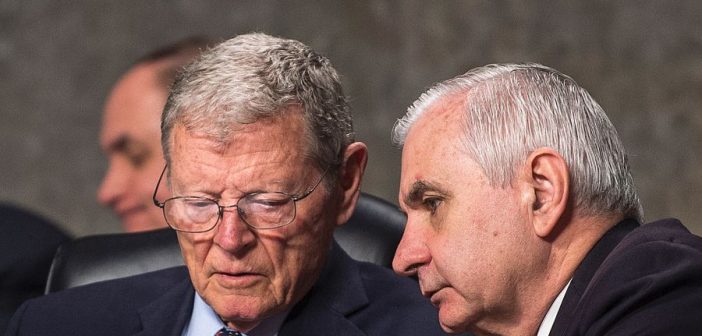By Mike McCord
With so much attention focused on issues where Republicans and Democrats don’t or can’t work together, much less has been said about issues where they must cooperate.
One such issue is funding government operations, and one hurdle that must be cleared to get that deal done is to move past the defense funding gimmick proposed in President Trump’s fiscal year 2020 budget request.
To avoid another fiscal crisis, we need a bipartisan deal to raise Budget Control Act (BCA) discretionary caps and the nation’s debt ceiling. While budget deals are best done behind closed doors, the lack of any apparent progress on this front is troubling.
Even without — but especially with — divided government, we need a deal that is fair for both defense and non-defense programs and respects the important role that the programs in each category play in keeping us strong and prosperous.
The administration’s 2020 budget proposal was a poor way to start the negotiations we badly need on spending. It is a step in the wrong direction and in sharp contrast to the far better path that last year’s budget proposal promised — but this year’s budget failed to deliver. The plan was to move the funding for those aspects of our presence in the Central Command region that are enduring — and not strictly tied to events in Afghanistan, Iraq or Syria — back into the base budget.
Despite this false start, we can still get where we need to be. Since the disastrous sequester of 2013, the BCA caps set in 2011 have been negotiated upward to more realistic levels by three two-year deals. One more such deal is needed.
The price should not be the extension of the BCA in anything like its current form. If discretionary caps are desired going forward, they should be constructed to reflect levels a bipartisan majority believes it can support and pass appropriations bills, rather than as a Dr. Strangelove-like “doomsday machine.”
Beginning with the budget deal that raised the discretionary caps for fiscal years 2016 and 2017, we saw the first instance of a cap for war-related Overseas Contingency Operations, or OCO, spending being set deliberately above known requirements, as a back-door way to raise the spending caps.
What began as a misdemeanor budget offense in fiscal year 2017 under the Obama administration of which I was a part, got much worse under the new administration. The 2020 budget requested an astounding $98 billion in OCO funding unrelated to actual war costs, raising the violation of honest budgeting to the level of a serious felony. The defense bills recently reported out by the House Appropriations Committee and Senate Armed Services Committee both wisely rejected this gimmick.
Why should anyone care about this gimmick if the overall funding levels are the same?
First, we will never get our deficits back under control using fake spending limits we aren’t going to even pretend to live by. Second, current as well as future citizens deserve to know the true financial cost of our conflicts in Iraq and Afghanistan.
Finally, to continue down this road of calling enduring costs emergency spending places those forces that have borne the heaviest burden of the fighting, such as Special Operations Command and Central Command, most at risk of having their core activities unfunded in the base budget when these conflicts end. To then propagate that risk across the entire Department of Defense as the administration proposes in the FY2020 budget is a mistake that will undermine sound planning and budgeting, weakening, not strengthening, our defense.
At this point, it’s worth taking a moment to review the history of OCO funding.
The concept of tracking the incremental costs of combat operations, from which today’s OCO is derived, came about during Operation Desert Storm, which occurred at the same time budget deals started imposing discretionary spending caps with defense and non-defense “firewalls.”
The concept actually worked very well for relatively short conflicts such as Desert Storm and the operations in the Balkans, which had well-defined direct costs and limited indirect ones. It has turned out not to work so well for the extended conflicts in Afghanistan and Iraq, where the cost implications are broader and our underlying bases and forces in the region support both conflicts, in addition to other missions.
The Defense Department’s National Defense Strategy calls for de-emphasizing, but not entirely disengaging from, the Middle East and the protracted counter-terrorism operations there. The National Defense Strategy Commission, an independent, bipartisan panel Congress set up to review that strategy — on which I served — was skeptical that we will be able to reprioritize away from this region to the extent the strategy assumes.
But even if we can, we will have enduring interests there, and so will have an enduring presence.
There is no good reason not to have the cost of that underlying presence in the Central Command region — an amount identified by the Defense Department as $41 billion in the 2020 budget — be included in the base budget in the same way we fund any net costs of our presence and operations in Europe and Asia. This is the direction the current and previous administration were trying to move on OCO prior to this year’s budget proposal.
We can’t expect the Defense Department to lead this charge. They have a job to do and will take the money needed to do it in base or OCO. It is up to the president and the congressional leadership who craft the budget deals to get this right.
There is no good reason not to move these costs back into the base budget while shielding agencies like the Defense and State Departments from harm as we make the shift.
This is the approach our bipartisan strategy commission recommended. The defense committees have not gone all the way there so far, but it is encouraging that they resisted the administration’s invitation to budget fantasyland and moved $98 billion back to the base budget where it belongs.
A budget deal should move the additional $41 billion back to the base budget as well.
OCO costs are sometimes erroneously called “off-budget.” In fact, OCO, or any emergency spending, affects the deficit in exactly the same way as if it was in the base budget. We fool nobody but ourselves by shifting enduring costs to an “emergency” category.
An infrastructure deal should get done. But a budget caps and debt ceiling deal must get done.
Such a deal can’t exclude defense, can’t be limited to just fixing defense, and must be bipartisan.
We cannot reach a deal if there are pre-conditions that there can be no agreement on the budget unless there are no disagreements on any other issues. The brinksmanship of 2011 and the Budget Control Act that resulted were mistakes we should learn from.
We have nothing to lose, and a better cleaner budget process to gain, by taking the steps now to get the way we treat war spending right, rather than make it far worse. We can’t build stable budgets based on a foundation of falsehood. A return to honest budgeting on the cost of military contingency operations is an important part of the budget solution the country needs.
Mike McCord was the under secretary of defense (comptroller) of the Defense Department from June 2014 to January 2017. He is now the director of civil-military programs at the Stennis Center for Public Service. The views expressed here are his own.




